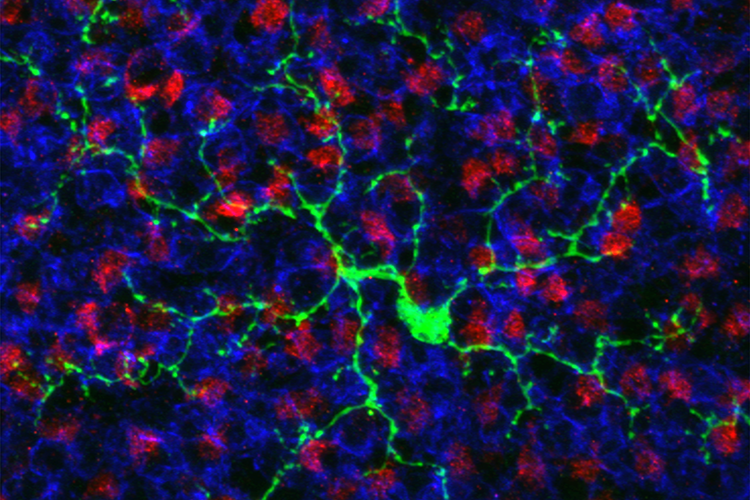
Get Inspired to Advocate by SfN's Early Career Policy Ambassadors
With the elections less than two weeks away, now’s a good time to start planning how you can educate your legislators about the importance of increasing funding for biomedical research. And when the election results are in, some districts will have new legislators who may not be familiar with the important contributions that neuroscience research makes to medical breakthroughs for diseases. It is essential for neuroscientists to continue to convey the significance of consistent, robust funding for biomedical research.
“If we’re not speaking for science, then no one will speak for science on our behalf,” Government and Public Affairs Committee Chair Bill Martin said. “Scientists should directly engage with policymakers because their voice is unique and the story that every scientist has can resonate with their policymakers.”
Neuroscience 2016
Animals in Research Panel: How to Engage Institutions to Publically Support Animal Research: A Top-Down Approach
Tuesday, Nov. 15, 10 a.m.-Noon
Public Advocacy Forum: Art, Music, and the Brain: How the Arts Influence Us from Youth to Maturity
Tuesday, Nov. 15, 3-5 p.m.
In her weekly advocacy message, Mary Woolley, president of SfN partner Research!America, noted that “we all have an opportunity to make the case to our elected representatives for support of all the sciences that are necessary to wrestling mental health challenges to the ground.”
For inspiration on how you can get involved, read below about the advocacy activities of SfN’s Early Career Policy Ambassadors (ECPA). In a yearlong program, these early-career scientists learn to communicate the crucial impact of neuroscience research to legislators and participate in SfN’s Hill Day, in addition to at least three additional advocacy-related activities at their states.
“It is essential to convey the importance of NIH-funded scientific research,” said 2016 ECPA Michael Calik, an assistant professor at the University of Illinois at Chicago. “If the legislative offices knew how important and impactful NIH-funded research, then it would become easier to get increases in federal funding.”
Set Up an In-Person Meeting
Scheduling a face-to-face meeting with an elected official is a great way to make your dialogue in support neuroscience more memorable and effective.
For example, 2016 ECPA Naomi Charalambakis, a graduate student at the University of Louisville, secured a meeting with Kentucky Gov. Matt Bevin after he attended the Louisville Regional Science and Engineering Fair, where he met with students who participated.
“It’s so important to show how science and engineering can be applied to real-life, real-world situations,” Charalambakis said. “Policymakers need to be aware of the work that’s going on because we can work together to improve society and the well-being of our state.”
Meeting with elected officials and their staff can also provide neuroscientists with insights into the legislative process and how to better advocate for their positions. 2016 ECPA Abigail Kalmbach, a postdoctoral fellow at Columbia University, met with New York state Sen. Liz Krueger earlier this year to discuss a bill related to funding for Alzheimer's research in the state.
Kalmbach said meeting with the senator gave her “tremendous insight and knowledge of the legislative process and of what makes a strong bill.”
Schedule a Lab Tour
When policymakers go on a lab tour, they get a firsthand view of how their own constituents are involved in important aspects of scientific research that improves the understanding of the brain and advances treatments and cures for disorders.
In early September, SfN Government and Public Affairs Committee member Kim Seroogy and 2015 ECPA Ryan Makinson, both of the University of Cincinnati, took U.S. Sen. Rob Portman (R-OH) on a tour of Seroogy’s lab, which studies Parkinson’s disease and depression.
“Portman got to see firsthand where NIH funds go and what they are used for, and I believe he came away with a better appreciation of the need for sustained NIH biomedical research funding,” Seroogy said. “I think these interactions gave the senator a more personal, human side to how research is conducted and how important students are to the research enterprise.”
Write a Letter
If you can’t meet with a lawmaker in-person, writing a letter or email is an effective alternative for expressing your personal connection to an issue while also conveying your opinion.
2016 ECPA Serena Gumusoglu of the University of Iowa started a Neuro Advocacy Group on her campus and also initiated a letter writing campaign.
“The goal of the group was to create a centralized platform for informing others at the university about ways that they could get involved,” she said. “Letter writing is a unique opportunity for people to feel directly involved in promoting science funding and advocacy.”
Write your elected officials when you want them to vote a certain way on a bill or to express your position on a particular issue.
Participate in SfN’s Hill Day
All ECPAs take part in this annual event during which SfN members meet with U.S. members of Congress and their staffs to discuss advances in the field of neuroscience, share the economic and public health benefits of investment in biomedical research, and make the case for strong national investment in scientific research through NIH and NSF. At the 2016 Hill Day, 52 SfN members from 20 states met with 71 congressional offices.
“It’s really important to step out of the lab and communicate to nonscientists about what you do so that they can get excited and see how science can impact their lives,” Charalambakis said.
International Collaboration
In addition to scheduling in-person meetings and lab tours or writing to local elected officials, international members can also support global neuroscience funding and research by getting involved with advocacy efforts of the International Brain Research Organization (IBRO) and the Federation of European Neuroscience Societies (FENS).
SfN collaborates with IBRO, FENS, and several other neuroscience organizations for the Global Advocacy Initiative, which aims to help develop culturally relevant, interesting educational programs that will create widespread support for neuroscience research across the world.






















